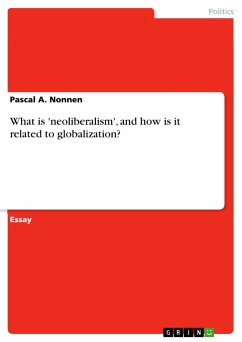Essay from the year 2017 in the subject Politics - International Politics - General and Theories, grade: 1,0, University of Edinburgh (School of Social and Political Science), course: Globalization, language: English, abstract: Upon zooming into the scholarly literature on neoliberalism one might quickly conclude that neoliberalism is to blame for many of the problems faced in the modern world. Critics like the linguist and philosopher Noam Chomsky understand neoliberalism as the emergence of large transnational corporations, which then become too powerful for nation states to regulate. At the same time we witness, according to Saad-Filho and Johnston, the rise of an extremely wealthy, but comparatively small elite group whose wealth exceeds the majorities' prosperity. Critical scholars in the fields of Social and Political Science, History, Economics, International Relations and Linguistics often trace this patterning of society from the rise of neoliberalism in the 20th century. Evolving from classical liberal convictions by European intellectuals in the 1920s, neoliberalism became realized in the form of classical liberal economic and political policies in the United Kingdom under Thatcher in the 1970s and in the United States under Reagan in the 1980s, when Keynesianism was predicted to fail. The commonly described characteristics of neoliberalism are the propagation of a free market economy and thereby the reduction of the state to a minimum. A free market economy with little state intervention would ensure the efficient allocation of resources and diminish the coercive power of the state. Proponents of the classical liberal economics like Friedrich von Hayek and Milton Friedman claim that only a free market society would guarantee individual liberty and democracy. To achieve this, classical economic policies like fiscal policy discipline, privatization, deregulation and the security of property rights were implemented, not only in the US and UK, butalso in other countries, mostly through the dictation of global institutions like World Bank and the International Monetary Fonds (IMF). Considering this development, neoliberalism seems to relate to economic and political processes, which can generally be brought under the umbrella of globalization. [...]
Hinweis: Dieser Artikel kann nur an eine deutsche Lieferadresse ausgeliefert werden.
Hinweis: Dieser Artikel kann nur an eine deutsche Lieferadresse ausgeliefert werden.








